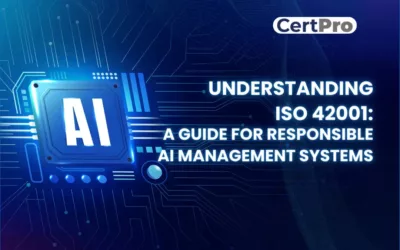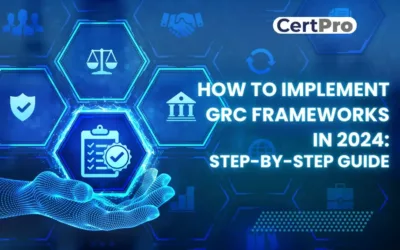ISO 41001:2018
FACILITY MANAGEMENT SYSTEM
In today’s fast-paced world, facility managers face numerous challenges due to evolving technologies, corporate mergers, and changing policies. Hence, the importance of ISO 41001 Certification becomes evident for organizations striving to enhance compliance and operational efficiencies. The latest standard, ISO 41001 Facility Management (FM), introduced by the International Standardization for Organizations in 2018, aims to improve the effectiveness and productivity of various elements in societies and organizations. This standard provides a systematic approach to measuring the competency and efficiency of services used by procurement and facilities teams.
The ISO 41001 Standard pioneers the development of professional facilities management as an interdisciplinary business function, facilitating seamless coordination between the demand and supply of facilities and services. Its primary objective is to ensure the effective and efficient delivery of facility management, consistently meeting the needs of all relevant stakeholders, thereby facilitating seamless business operations.
By obtaining ISO 41001 Certification, organizations gain a structured framework that spans the entire supply chain, from procurement to operations and maintenance. Obtaining this certification impacts the quality of life for individuals and enhances the productivity of essential business operations.

Certification and Auditing Services by CertPro
At CertPro, we understand the significance of adhering to ISO 41001:2018 standards and the benefits of achieving ISO 41001 certification for organizations seeking to enhance their facility management system. We offer comprehensive assistance to organizations embarking on the path to ISO 41001 certification. Our expert team will support you every step of the way, ensuring that your facility management practices align with the latest ISO 41001 requirements. We will work closely with your team to develop and implement a tailored facility management system that meets your unique needs and industry regulations.
WHY CHOOSE CERTPRO FOR ISO 41001:2018 CERTIFICATION AND AUDITING?
CertPro is a trusted and reliable partner for ISO 41001:2018 certification and auditing services. With our wealth of experience spanning almost a decade, we possess an in-depth understanding of the intricacies involved in facility management. Here are several compelling reasons why CertPro is the perfect choice to meet your ISO 41001 certification needs:
| Factors | CertPro Advantage |
|---|---|
| Time to Certification | 4x faster than traditional approaches |
| Price | Competitive rates with flexible options |
| Process | Streamlined and efficient methodology |
| Expertise | 10+ years of industry experience |
CERTPRO’S COST-EFFECTIVE APPROACH TO ISO 41001:2018 CERTIFICATION
For ISO 41001:2018 certification, the cost aspect is essential for consideration, including various factors that impact expenses. At CertPro, we recognize the significance of cost-effectiveness and endeavor to deliver customized and budget-friendly solutions to fulfill your ISO 41001 requirements. Here is an outline of our cost-effective approach to ISO 41001 certification:
| No. of employees | Timeline | Cost (approx.) |
| 1 – 25 | 4 weeks | 2500 USD |
| 25-100 | 6 weeks | 4500 USD |
| 100-250 | 8 weeks | 7500 USD |
| 250 plus | 8-12 weeks | Custom plans |
UNDERSTANDING ISO 41001:2018 THE FACILITY MANAGEMENT STANDARD
ISO 41001 is an international standard for professional facilities management, aiming to coordinate the supply of facilities and services. Its goal is to ensure consistent and continuous delivery of Facility Management (FM) that meets the needs of clients and interested parties, enabling smooth business operations. This standard promotes effective communication and performance assessment within FM organizations, elevating quality levels and enhancing competitiveness in the global market. ISO 41001 improves care standards, fosters organizational maturity, and drives excellence in Facility Management delivery. The ISO 41001:2018 FMS is categorized into Hard Facility Management and Soft Facility Management, enabling seamless administration and operations throughout the year.
According to ISO 41001:2018, “Hard Facility Management” refers to the physical components of the built environment, such as workspace and building infrastructure. Compliance with Hard facility management is necessary and cannot be omitted from the process. It includes services such as heating, lighting, plumbing, fire and safety systems, air conditioning, preventive building maintenance, electro-mechanical maintenance, and more.
In Soft Facility Management, we prioritize enhancing the occupant experience by focusing on people and organization in the facility. The goal is to make the building safer and more delightful for its residents. However, it is necessary to note that these services are not mandatory and will be withdrawn if deemed necessary. Some examples of soft services include aesthetics, building security, cleaning, catering, mail management, and maintaining decorum.
PRINCIPLES OF ISO 41001:2018 CERTIFICATION
Based on several principles, ISO 41001 Certification guides organizations in establishing and maintaining effective facility management systems. The ISO 41001 principles are as follows:
- Customer Focus: ISO 41001 Certification emphasizes improving for the benefit of interested parties and customers. By sustaining and increasing their customer base, organizations ensure effective communication of customer needs and expectations through organization-wide monitoring.
- Leadership: ISO 41001 Certification necessitates that leaders establish a unity of purpose by aligning strategies, policies, procedures, and resources. It fosters better coordination of organizational processes, cultivating a culture of trust, integrity, and accountability. Leaders must provide people with the necessary resources, training, and authority to act effectively.
- Engagement of People: ISO 41001 Certification emphasizes the involvement of people at all levels for optimal efficiency. It involves effective communication of organizational needs to employees, sharing knowledge and experiences, recognizing contributions, and fostering a culture of continuous learning and improvement.
- Process Approach: ISO 41001 Certification promotes a process approach, where activities are thoroughly understood and executed to enhance the efficiency of delivered outputs. By understanding the organization’s capabilities and identifying resource constraints beforehand, organizations can optimize their actions and achieve better results.
- Improvement: ISO 41001 Certification underscores the significance of constant enhancement in an organization’s performance and development. It involves providing adequate training, understanding work processes, conducting reviews and audits, and recognizing achievements. Such practices help anticipate risks and opportunities, resulting in Enhanced Process Performance and Sustainable Growth.
- Evidence-based decision making: ISO 41001 Certification promotes learning from mistakes and basing decisions on evidence and data evaluation for efficient and effective solutions while acknowledging the value of intuition.
- Relationship Management: ISO 41001 Certification emphasizes managing relationships with relevant stakeholders, including providers, through a well-managed supply chain that ensures a stable flow of products and services. Organizations identify and proactively manage relationships with interested parties.
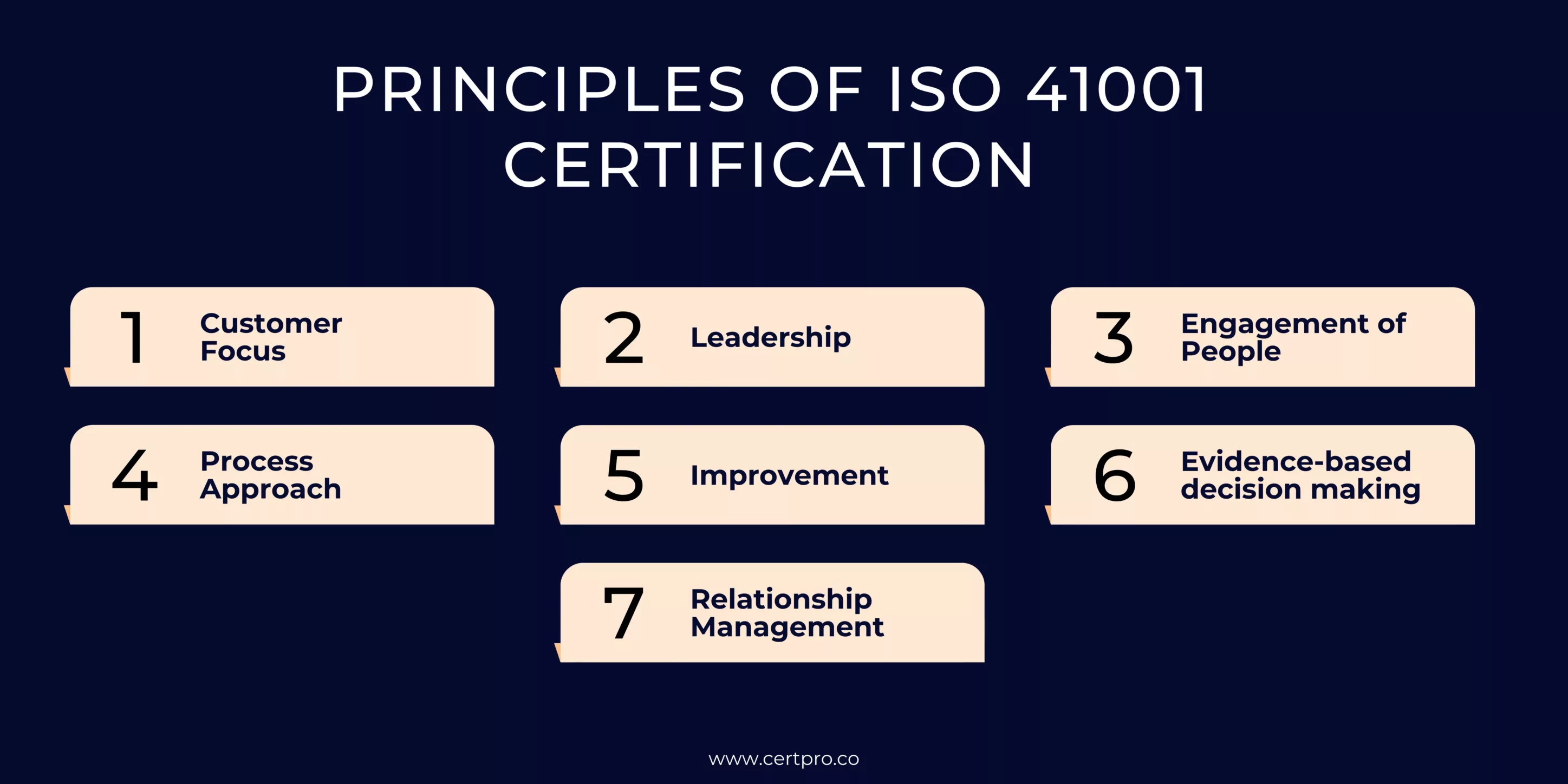
THE STEPS TO GET AN ISO 41001:2018 CERTIFICATION
Achieving ISO 41001 certification allows organizations to showcase their dedication to high-quality facility management system (FMS) practices, enhance operational efficiency, and elevate their reputation. The following are the general steps to obtain ISO 41001 certification:
Step 1: Understand the Requirements
The first step in obtaining an ISO 41001 certification is to thoroughly read and study the ISO standard, ensuring a comprehensive understanding of its requirements and how they relate to your organization’s facility management system (FMS) practices.
Step 2: Perform Gap Analysis
Conduct a thorough gap analysis to identify discrepancies between your organization’s facility management system (FMS) practices and the requirements outlined in ISO 41001. This analysis enables you to determine the scope of the certification process by highlighting areas that need improvement to meet the standard’s criteria.
Step 3: Develop an Implementation Plan
Using the findings from the gap analysis, create a comprehensive implementation plan that outlines the necessary actions to bridge the gaps in your organization’s facility management system (FMS) practices. This plan should include specific steps tailored to meet the requirements of ISO 41001 and ensure compliance with the standard.
Step 4: Implement the Plan
After finalizing the implementation plan, take action to implement the necessary changes to your facility management (FM) practices. It includes providing employee training, updating policies and procedures, and making essential modifications to your operational processes to ensure compliance with the ISO 41001 requirements.
Step 5: Perform Internal Audits
Regularly conduct internal audits to verify the compliance of your facility management system (FMS) practices with the ISO 41001 standard. These audits help ensure that your organization’s FMS aligns with the requirements set forth by ISO 41001.
Step 6: Obtain Certification
Upon confirming the compliance of your facility management (FM) practices with ISO 41001 requirements, actively engage an accredited certification body to conduct a comprehensive audit of your facilities. Successful completion of the audit will result in the distribution of an ISO 41001 certification to your organization.
Step 7: Maintain Certification
To sustain your certification, actively monitor and enhance your facility management system (FMS) practices. Regularly conduct internal audits and participate in ongoing training and education initiatives to ensure continuous improvement and compliance with ISO 41001 standards.
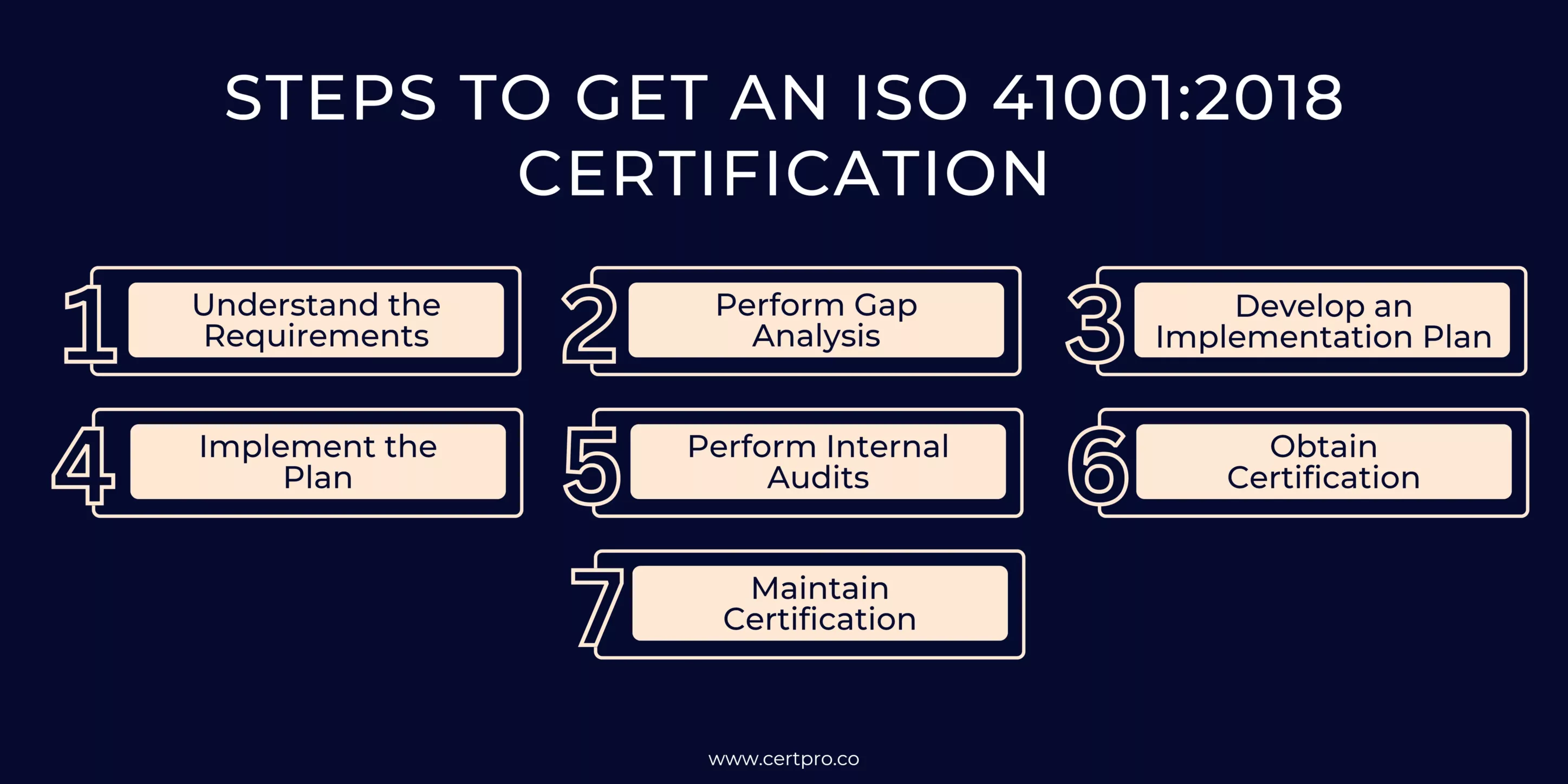
ISO 41001:2018 CHECKLIST: ESSENTIAL REQUIREMENTS FOR FMS
The requirements of ISO 41001 entail several Key aspects that organizations should be aware of when embarking on the journey toward certification. The following list contains the sections (clauses) of the standard and provides an overview of what certification entails for your organization:
Clause 1: Understand the scope of the standard
Familiarize yourself with ISO 41001’s scope, which guides organizations to implement effective FM systems worldwide, irrespective of size, type, or jurisdiction. It doesn’t offer specific legal information but aids in regulatory compliance.
Clause 2: Refer to Supporting Documents
Before ISO 41001, reference documents like ISO 41011, defining facility management terminology, were published. Having access to these documents while reviewing the standard is beneficial.
Clause 3: Understand Terminology
ISO 41011’s definitions are crucial for interpreting ISO 41001. The latter also includes a list of terms, such as management system, stakeholder, top management, and continual improvement, that aid in implementing the standard.
Clause 4: Context of the organization
This section addresses understanding your organization’s needs for implementing the Facility Management System (FMS). It enables tailoring the FMS to align with your organization’s specific requirements.
Clause 5: Leadership
Identify the leadership roles within your facility management, establish policies, and define organizational responsibilities to create an effective plan that aligns with your objectives.
Clause 6: Planning
Analyze the existing system, conduct risk analysis, and establish strategies to mitigate risks while setting objectives for an efficient Facility Management System (FMS). Evaluate organizational interactions across all levels and channels.
Clause 7: Support
Manage all resources essential for your Facility Management System (FMS) and oversee the control of documented information within the organization.
Clause 8: Operation
Address operational requirements for facility control and prepare the organization for potential emergencies as outlined in this section.
Clause 9: Performance Evaluation
This section focuses on ensuring the efficiency of your Facility Management System (FMS). It involves monitoring, measuring, and evaluating the current system to identify areas for improvement and enhance overall performance.
Clause 10: Continual Improvement
This aspect ensures the effectiveness of your Facility Management System (FMS). It involves ongoing review and assessment of FMS conformity with the ISO 41001 standard, fostering a culture of continuous improvement within the organization.
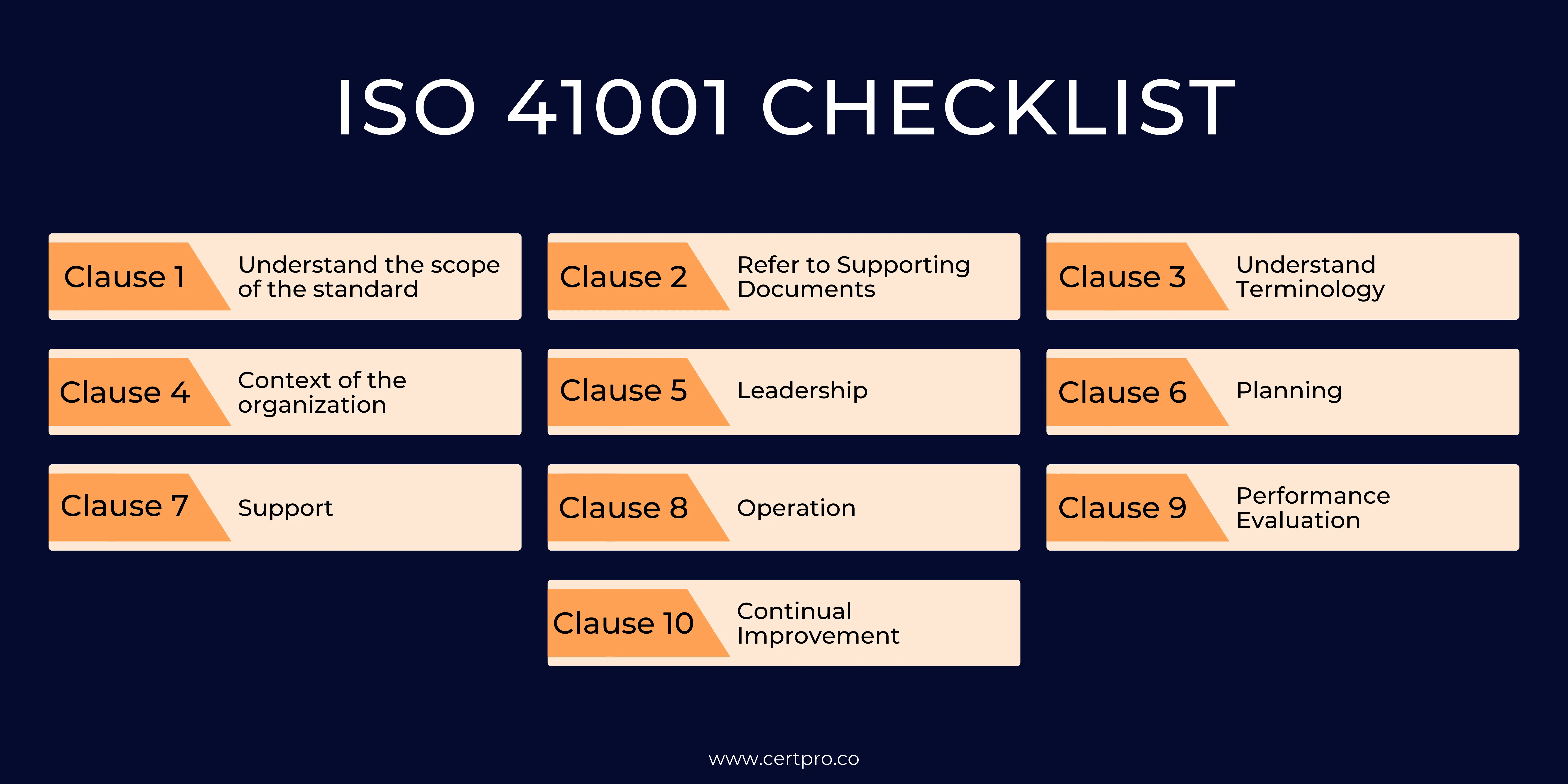
BENEFITS OF ISO 41001:2018 CERTIFICATION
The facility management sector’s value is estimated to reach $1 trillion by 2025, highlighting the need for a dependable system. ISO has introduced the ISO 41001 Certification to enhance the efficiency and effectiveness of facility management. The ten advantages of this certification for organizations are as follows:
- Maintains Regulatory Compliance: ISO 41001 Certification aims to enhance facility management systems and ensure compliance with relevant regulations and standards, although non-compliance does not incur penalties.
- Provides a Competitive Edge: ISO 41001 Certification showcases an organization’s commitment to ongoing improvement in financial management services, offering a competitive advantage that attracts new businesses, clients, and customers.
- Enhanced Reputation: The ISO 41001 Certificate elevates an organization’s reputation by fostering a culture of safety, security, and improved performance, enhancing its overall standing and credibility.
- Increased Marketability and Profitability: ISO 41001 Certification enhances organizations’ marketability and profitability by ensuring the delivery of safe facility services and fostering a productive workplace environment.
- International Market Access: Implementing a facility management system standard enables organizations to access the international market by eliminating trade barriers. This certification demonstrates the organization’s ability to incorporate international best practices, unlock global opportunities, and expand its international presence.
- Cost-effectiveness: ISO 41001 Certification is a cost-effective standard that improves workforce productivity, safety, and well-being, leading to savings on compensation amounts and premiums.
- Strategic Approach: An organization certified with ISO 41001 adopts an approach that assures and adds value to stakeholders strategically. This certification ensures risk-specific and highly efficient business operations.
- Adaptability: ISO 41001 Certification is a dynamic standard that empowers organizations to adapt to evolving trends in infrastructural development. It enables the adoption of tools and techniques to manage these changes.
- Risk-Based Approach: ISO 41001 Certification encourages organizations to adopt a risk-based approach, enabling them to identify potential threats and opportunities related to their facility management system.
- Enhanced Employee Experience: ISO 41001 Certification focuses on improving the employee experience by promoting supportive, sustainable, and productive workplaces, thereby fostering a positive and enriching work environment.
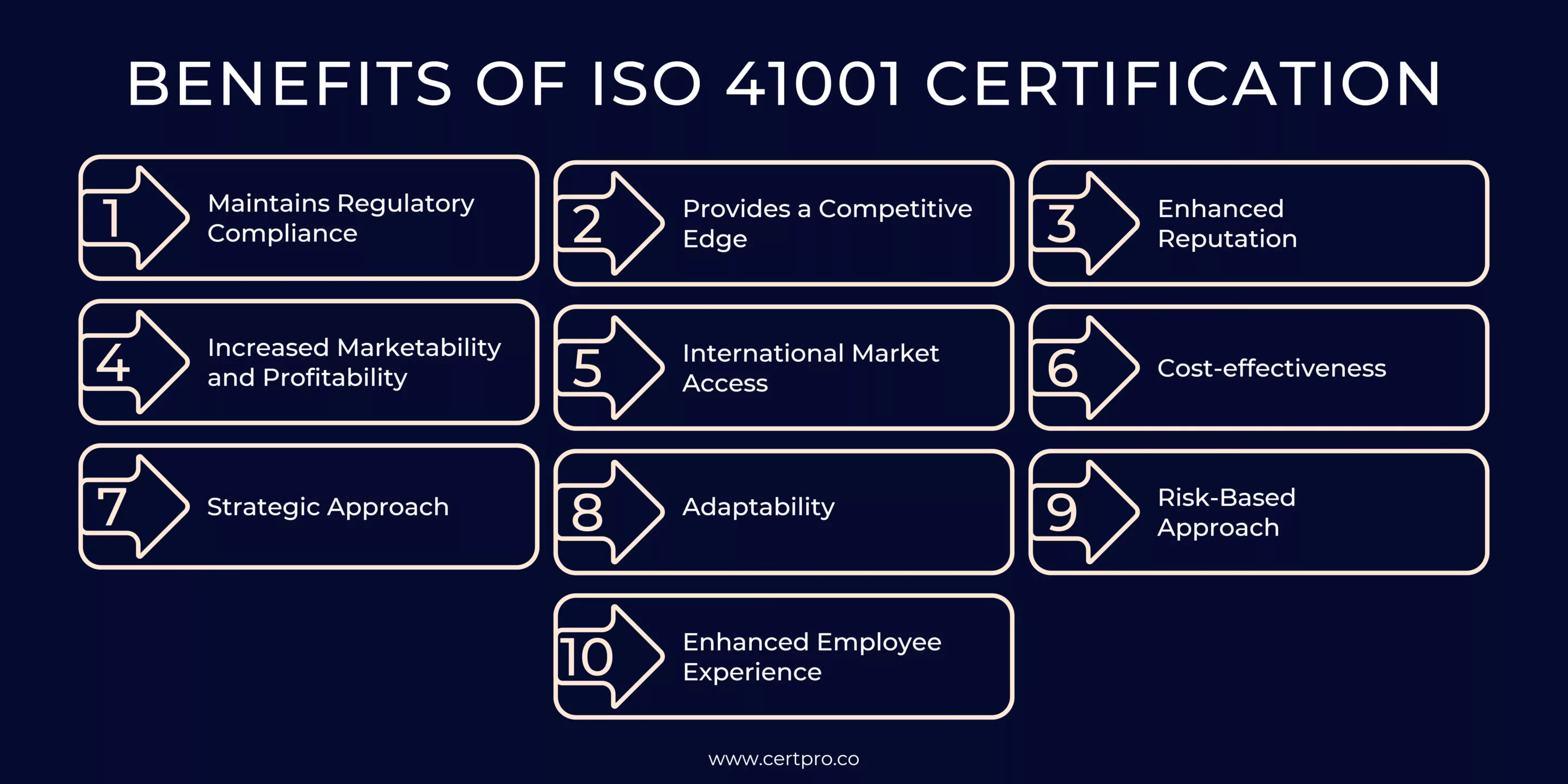
ELIGIBILITY FOR ISO 41001:2018 CERTIFICATION AND WHO CAN OBTAIN IT
Companies and organizations of all sizes and sectors can be eligible for ISO 41001 certification. An organization seeking to implement an effective Facility Management System (FMS) and demonstrate commitment to high-quality FMS practices can pursue ISO 41001 certification. The standard is not limited to specific regions or industries. It applies to a wide range of organizations, including, but not limited to:
-
- Business organizations: Manufacturing plants, retail outlets, offices, and warehouses
- Healthcare organizations: Hospitals, clinics, and healthcare centers
- Educational institutions: Schools, universities, and research centers
- Government agencies: Municipal buildings, police stations, and public works facilities
- Hospitality organizations: Hotels, resorts, and restaurants.
- Transportation organizations: Airports, seaports, and train stations
- Sports and entertainment organizations: Stadiums, arenas, and amusement parks
- Non-profit organizations: Museums, libraries, and community centers
DETERMINING THE COST OF FOR ISO 41001:2018 CERTIFICATION
Determining the cost of ISO 41001 Certification involves considering various factors, including the size and type of the organization. To provide an accurate proposal, certification bodies commonly request the following information:
- Size and Type of Organization: The number of employees (full-time, part-time, and seasonal) and the nature of the organization’s operations
- Key Activities and Processes: A detailed overview of the organization’s key activities and the processes involved in facility management
- Number and Location of Sites: Information about the organization’s remote sites and the location of operations
- Detailed Site Information: Specifics about the site where facility management services are provided, including the type of activities carried out
- Key Contact Person: The name and contact information of a key contact person who can provide further details and facilitate communication
Certification bodies rely on this information to accurately assess the scope and complexity of an organization’s facility management system. With these details, they can provide a competitive quote for ISO 41001 Certification that aligns with the organization’s specific requirements.
DURATION AND RENEWAL OF ISO 41001:2018 CERTIFICATION
ISO 41001 certification provides organizations with a validity of three years. During this duration, companies can proudly demonstrate their adherence to the ISO 41001 standard and the effective implementation of their facility management system (FMS).
At the end of the three-year certification period, organizations should undergo a reassessment process to renew their certification. This reassessment ensures that the company’s FMS continues to meet the requirements of ISO 41001 and demonstrates its commitment to maintaining high-quality facility management practices.
By participating in the reassessment process and successfully demonstrating ongoing compliance, organizations can extend their ISO 41001 certification, reinforcing their dedication to efficient facility management and continual improvement.
CERTPRO: YOUR GUIDE TO ACHIEVING ISO 41001:2018 CERTIFICATION
CertPro specializes in helping businesses obtain ISO 41001 certification, which focuses on facility management systems. With a team of experienced auditors and consultants, CertPro guides your business through the certification process, ensuring compliance with ISO 41001 requirements. They assess your facility management system, identify areas for improvement, and help implement effective strategies and controls. CertPro provides documentation support, training, and expert guidance to align your organization with ISO 41001 standards. By partnering with CertPro, your business can demonstrate its commitment to excellence in facility management, enhance operational efficiency, and improve customer satisfaction. Achieving ISO 41001 certification with CertPro’s assistance showcases your organization’s dedication to maintaining high-quality facilities and positions you as a leader in the facility management industry.
FAQ’s
IS ISO 41001 CERTIFICATION MANDATORY?
No, ISO 41001 Certification is not a mandatory or regulatory requirement. However, organizations should consider it a moral obligation and responsibility to enhance their Facility Management System (FMS) for improved efficiency and productivity. ISO 41001 enables organizations to improve their management performance by optimizing resource utilization and reducing waste.
WHAT IS THE ROLE OF LEADERSHIP IN ISO 41001 IMPLEMENTATION?
Leadership plays a crucial role in ISO 41001 implementation by providing a clear vision, setting objectives, allocating resources, and establishing a culture of continuous improvement. Leaders ensure the integration of facility management practices into the overall organizational strategy and foster commitment to achieving ISO 41001 certification.
CAN NON-COMPLIANCE WITH ISO 41001 LEAD TO LEGAL PENALTIES?
While ISO 41001 certification is not a legal requirement, non-compliance with applicable regulations and laws related to facility management can result in legal penalties. Organizations should ensure compliance with relevant local, state, and national laws to avoid legal consequences.
HOW LONG DOES IT TAKE TO GET ISO 41001 CERTIFIED?
The time required for ISO 41001 certification depends on various factors, including the complexity of the organization’s facility management system and readiness for implementation. The process generally consists of several stages, including gap analysis, implementation, internal audits, and external audits. The timeline for ISO 41001 certification can vary from a few months to more than a year.
CAN ISO 41001 NON-COMPLIANCE AFFECT THE ORGANIZATION’S COMPETITIVENESS?
Yes, ISO 41001 non-compliance can affect an organization’s competitiveness. In today’s business landscape, clients and stakeholders often prioritize working with organizations that demonstrate adherence to internationally recognized standards. Non-compliance may result in the loss of business to competitors who have achieved ISO 41001 certification, as it showcases their commitment to effective facility management.
UNDERSTANDING ISO 42001: A GUIDE FOR RESPONSIBLE AI MANAGEMENT SYSTEMS
The invention of artificial intelligence (AI) has changed the operational processes of many industries. However, the rapid growth of technology increases ethical, security, and privacy-related concerns. Therefore, the International Organization for Standardization...
EUROPEAN UNION’S ARTIFICIAL INTELLIGENCE ACT: HOW THIS GROUNDBREAKING LAW AFFECTS YOUR BUSINESS
Nowadays, Artificial Intelligence (AI) is transforming our lives exceptionally well. AI is now streamlining healthcare services, providing virtual assistance, and fulfilling queries. Technologies have boons and curses. Similarly, AI creates many concerns about...
How to Implement GRC Frameworks in 2024: Step-by-Step Guide
The rapidly evolving business environment, complexity, and accountability enhance the importance of the organization's governance, risk management, and compliance initiatives. Therefore, if your company finds difficulties expanding, recheck your organization's...

